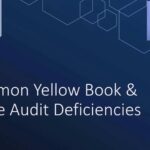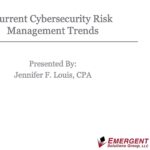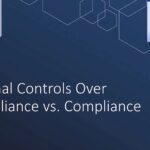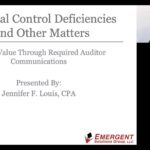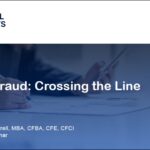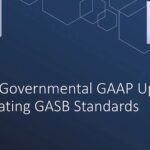Nonprofit entities have a high degree of public accountability. This course will examine the most common fraud schemes and provide multiple examples of how to prevent or detect these schemes.
(LIAA14/26) Common Yellow Book & Single Audit Deficiencies
This course will review focus areas for peer review of Single Audits and Yellow Book engagements. We discuss the requirements for major program determination, testing compliance, testing internal controls over compliance, sampling, and reporting for Single Audits. We also address Yellow Book CPE and independence requirements. In addition to providing an overview of the common deficiencies and key trends identified by the AICPA, this course will also provide best practices for how entities can properly perform procedures in these areas.
Current Cybersecurity Risk Management Trends (LIAA10/26)
One of the top concerns of any organization’s leadership is how to mitigate the risk of cybersecurity threats, along with the prevention and detection of fraud. This course will focus on the most common cybersecurity vulnerabilities and fraud trends, and best practices for managing them. Discussion Leader: Jennifer Louis
Introduction to Not-for-Profit Accounting (LIAA09/26)
Not-for-profit organizations encounter distinct accounting complexities. This course provides an introduction to the financial statements and specialized accounting principles relevant to nonprofits. Attendees will explore key topics such as net assets, agency transactions, contributions, and endowments, focusing on the unique transactions and account balances that define not-for-profit accounting. Discussion Leader: Melisa Galasso
Internal Controls Over Compliance (LIAA35-26)
Accurately identifying and testing controls over compliance is critical, yet it remains a common deficiency highlighted in peer reviews. This course offers a comprehensive overview of internal controls over compliance, with a focus on their application to Single Audits. Participants will learn how to effectively align internal controls with specific compliance requirements. Additionally, we will address one of the most frequent findings in audits of governmental entities receiving federal grants: the misidentification of controls and the confusion between compliance and control processes. This course will help clarify the distinction, equipping you with the tools to enhance audit quality and ensure compliance effectiveness. Discussion Leader: Melisa Galasso
Accounting for Investments Under US GAAP (LIAA07/26)
Understanding the proper accounting for and reporting of investments can be challenging, especially given recent changes to U.S. GAAP. This course will provide critical considerations when evaluating the proper treatment of basic investments in other entities and other common investments for nonpublic entities in U.S. GAAP-basis financial statements, including consideration of recent changes in financial instrument accounting, reporting, and disclosure. Discussion Leader: Jennifer Louis
Introduction to Governmental Accounting (LIAA06/26)
Governmental accounting is very unique. This course will introduce the financial reporting basics for governments, including fund accounting and the modified accrual basis of accounting. Attendees will analyze the layouts of the fund financial statements as well as the government-wide financial statements. The course will also cover the concept of component units, Management Discussion & Analysis (MD&A), and the Annual Comprehensive Financial Report. Discussion Leader: Melisa Galasso
Fraud- Crossing the Line (LIAA03/26)
When talking about occupational fraud and crossing the line, did the perpetrator pause to weigh the risk versus reward? What type of fraud schemes are being employed by the perpetrator and what should a business do to better protect itself and its employees. Discussion Leader: Ramona Farrell
Governmental GAAP Update (LIAA02/26)
This course begins with a look at the GASB standards effective this year, including GASB 100, Accounting Changes and Error Corrections and GASB 101, Compensated Absences. We’ll include practical application of the topics in the form of case studies. Discussion Leader: Melisa Galasso

